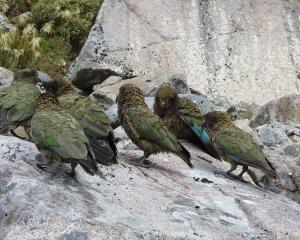
The party, which enjoyed spectacular success in the seats south of the Waitaki in last year’s general election, bullishly proclaimed as the dust settled that it was going to set up a Southern base and consolidate that record level of support.
The meeting will be discussing just how to do that, and more besides.

The party hierarchy is also developing plans to deploy its list MPs into the provinces, allocating each of them a region or regions to look after.
This is something other parties do — southern Labour list MPs Liz Craig and Rachel Brooking are encouraged to have a presence in neighbouring National-held seats — and it makes good sense to give Act’s large backbench something to keep it occupied.
The party’s "southern" MP may well be a northerner — Nelson-based Chris Baillie and Invercargill-born but Christchurch-based Toni Severin are its only South Island MPs and they have their own sizeable patches to tend.
This is very much on party leader David Seymour’s radar — he has taken a personal interest in Queenstown and expects other MPs to venture south regularly.
Act’s strategy is to do the hard yards at grassroots level to boost its nationwide presence, and its MPs have been told they are not to be Wellington-bound but to get out and about the countryside to talk to as many people as possible.
Hence, on Mr Seymour’s pre-Christmas road trip around the South to thank party supporters, a bevy of backbenchers accompanied him.
Rural spokesman Mark Cameron has also been quietly doing the rounds of southern farmers, as Act sees a strong stance on fresh water reform as key to maintaining some of the countryside support it siphoned off National last year.
Beyond the recently greatly enlarged Parliamentary wing, Act is also looking at creating a provincial infrastructure which did not exist beforehand.
Having seen its number of party votes in this part of the world increase from double digits to four figures, Act wants to turn that into a commensurate rise in party membership and build a branch structure within which those potential activists can operate.
The party, for so long a one man band, has always battled to make an impression in the South and regularly, including last year, was unable to find a candidate to stand in some seats.
It is keen to avoid a repetition of that, and is already considering names to fly its flag in Otago and Southland in 2023.
Greatly adding to Act’s lustre is that it has hit the ground running since Parliament resumed.
Its greatest asset remains its effervescent leader, but deputy leader Brooke van Velden has been given a heavy workload in the House to support him.
The remaining MPs are still finding their feet but have done little to upset the apple cart, and Act’s double focus on holding the Government to account and offering constructive alternatives has made its expanded caucus achieve credibility more quickly than expected.
Act has to be a little careful, as it knows its way to actual power will be as a support party for National.
It has to strike a balance between preserving, or even expanding, on its 2020 gains, but not cannibalising the right wing vote to the extent that National cannot score enough votes to form a government.
But for now it is loudly pleased with its start to the political year, and quietly working to consolidate its greatly expanded position.
Water, water everywhere
Act is not the only party hoping to gain support on the back of water issues in the South.
Southland MP Joseph Mooney and Invercargill MP Penny Simmonds have written a joint letter to Environment Minister David Parker highlighting farmer concerns about winter grazing regulations in the new freshwater standards.
Mr Parker may not be of a mind to put a letter from two first-term National MPs on top of the to-do list, but their mention of a 500-strong public meeting near Gore on the subject might give the minister cause to pause and ponder local concern about the issue.

It was a special occasion for stalwart unionist Jim Kelly, who last week was presented with an MNZM for services to the trade union movement by Dunedin Mayor Aaron Hawkins at a town hall investiture ceremony.
Rail and Maritime Transport Union national president from 1990 until 2011, Mr Kelly has taken generations of politicians to task over the importance of KiwiRail’s Hillside workshops in particular and the preservation of worker’s rights in general.












